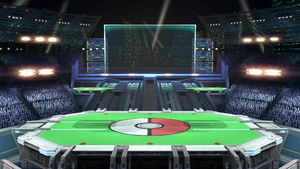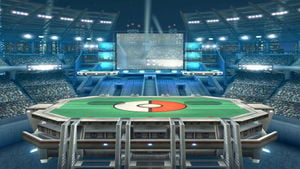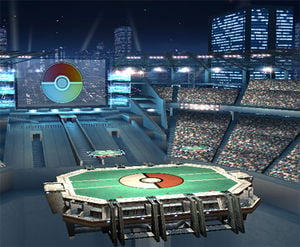- Not to be confused with Pokémon Stadium.
| Pokémon Pokémon Stadium 2 | |
|---|---|
 Pokémon Stadium 2 across the series. | |
| Universe | Pokémon |
| Appears in | Brawl SSB4 (Wii U) Ultimate |
| Availability | Starter (Brawl and Ultimate) Unlockable (SSB4) |
| Unlock criteria | Clear the When Lightning Strikes event. |
| Crate type | Futuristic (Brawl) Normal (Wii U and Ultimate) |
| Maximum players | 4 (Brawl) 8 (Wii U and Ultimate) |
| Article on Bulbapedia | Pokémon Stadium 2 (stage) |
Pokémon Stadium 2 (ポケモンスタジアム2, Pokémon Stadium 2) is a stage in Super Smash Bros. Brawl, Super Smash Bros. for Wii U and Super Smash Bros. Ultimate, based on the Pokémon universe. It is the successor to Pokémon Stadium in Super Smash Bros. Melee, with all new transformation types. Unlike its predecessor, the types feature effects relevant to the type.
Jigglypuff is fought here in its unlocking battle in Brawl, while in Ultimate, Pichu is fought here in its unlocking battle.
Stage overviewEdit
Overall, this stage works very similarly to Super Smash Bros. Melee's Pokémon Stadium: it switches from a basic version to type-inspired transformations. The layout of the basic version is extremely similar to the Melee version, with a main platform with a solid pillar underneath and two floating soft platforms on the sides. The background features a crowd, much farther away than the one in the original Pokémon Stadium, and a jumbotron which, like the one in Pokémon Stadium, displays either the battle, a symbol denoting the upcoming transformation, or the current standings of each fighter and the time remaining.
The other transformations, however, are all completely new and have more type-related features that affect gameplay. Like in Pokémon Stadium, they appear in no specific order and it is even possible for the stadium to change into the same type twice in a row. Like its predecessor, it always begins on the standard arena and transforms and has to revert back to its normal state before transforming again. Several Pokémon appear in the background during the various phases, with no actual effect on the battle.
Electric versionEdit
The Electric version features two slightly raised conveyor belts which occupy the sides of the main platform, both pushing outwards. The center of the main platform is static. There are three soft platforms in varying locations: two, one above the other, are over the middle of the stage, while the third can be over either conveyor belt.
An Electivire appears in the background on the left side, and a Magnezone pops up and down on the right side hiding behind the machinery.
Flying versionEdit
The Flying version features fans in the ground which create an updraft and a slightly raised floor. In Brawl and Smash 4, this has a similar effect to the "light" Special Smash setting, reducing the fall speed and gravity of all fighters, and thus allowing them to jump higher and stay in the air longer. Characters flung upward have a much higher chance of being Star KO'ed. In Ultimate, the form instead uses a weak upwards wind zone, which covers the area directly above the main platform, rather than the entire screen being affected, and in some circumstances the wind can cause fighters to float upwards rather than fall downwards. The strength of the wind is equivalent to a wind strength of 22.5 on Stage Builder (0.45 units per frame).
A Drifloon, a Hoppip, and a Skarmory fly about in the background.
Ground versionEdit
In the Ground version the layout changes to a large solid mound of dirt on the left and a hut built into a tall rock on the right. The hut provides two platforms, the lower one being longer and curved, and the higher one being short and flat. No physics alterations are added.
A Cubone and a Dugtrio appear in the background, along with a fossil (possibly a Helix Fossil) embedded in the rock.
Ice versionEdit
In the Ice version all platforms and surfaces become extremely slippery, so characters are more likely to trip. A hut can be seen in the background, and there are two icy platforms that slope inwards slightly.
A Snover always appears in the background, and a Snorunt might appear in the hut.
8 PlayerEdit
In Super Smash Bros. for Wii U, during a 8-Player Smash the stage always remains in its basic form and the screen in the background is blank.
Ω forms and Battlefield formEdit
In Super Smash Bros. for Wii U, the Ω form only features the basic version of the stage, with the floating platforms removed but the pillar at the bottom still present. The jumbotron doesn't display any stats and will only show the battle in progress without zooming into any of the characters (except in 8-Player Smash, where the screen will be entirely blank). The stage also does not change.
In Super Smash Bros. Ultimate, the main platform of the Ω form and Battlefield form is identical to SSB4's Ω form; however, it is resized and reshaped to match Final Destination and Battlefield, respectively. The three soft platforms of the Battlefield form are based on the ones in the normal form. The jumbotron only displays the current stage, the current leader, and will focus on one of the fighters. Each segment will be displayed for five seconds before blanking out for one second and then showing either the same or a different segment.
Hazards OffEdit
With hazards off in Ultimate, the stage remains in the default form for the whole match.
OriginEdit
Like its predecessor, this stage seems to be based on the arenas from the Pokémon Stadium series. Its name could be a reference to the game Pokémon Stadium 2 (either Japanese or international) for the Nintendo 64.
The flying transformation's aesthetics are reminiscent of Valley Windworks from the Sinnoh region: they both feature wind turbines and, in Diamond/Pearl/Platinum, the Valley Windworks was the only location where a Drifloon, like the one appearing on this stage, could be encountered.
The electric transformation's mechanical appearance could be a reference to the recurring Power Plant setting in the series, where Magnemite, Magneton and Electabuzz (the previous forms of Magnezone and Electivire) can be often encountered.
Tournament legalityEdit
BrawlEdit
Pokémon Stadium 2 is a very controversial stage; it is usually banned in tournaments, although it is allowed as a counterpick in more liberal rulesets. This is because the majority of its transformations are widely considered disruptive to normal gameplay: the electric transformation produces fast conveyor belts that force players to camp the ledge or fight in the middle of the stage; the wind transformation significantly reduces gravity, which slows aerial approaches and results in earlier vertical KOs; and the ice transformation creates slippery terrain which universally decreases traction and slightly increases tripping chance, making more precise movements difficult. Additionally, like the original Pokémon Stadium, all of its transformations except for ice are susceptible to camping.
Some smashers, however, debate this stage's banning, arguing that its perceived disruptive elements are either due to player error or actually beneficial to gameplay. For example, they claim that players can camp out the electric transformation, and that any self-destructs are due to unfamiliarity with the stage rather than a flaw in the stage itself. They also argue that the wind transformation, while actually disruptive, does not last long enough to significantly impact the match. Finally, they suggest that the ice transformation actually enriches gameplay because its terrain boosts the speed and slide distance of DACUSes and slide smashes, and causes shields to be pushed back more, forcing the game to be played more offensively.
Regardless, Pokémon Stadium 2 remains often banned due to the very specific ways in which players have to adjust to the disruptive nature of transformations.
Smash 4Edit
Pokémon Stadium 2's transformations are still seen as disruptive as they were in Brawl, though due to the competitive community in Smash 4 becoming a lot more conservative with stage legality, it never saw real use as a legal stage nor contentious debate about it anywhere unlike it did in Brawl.
UltimateEdit
Pokémon Stadium 2 is a starter stage in Ultimate tournaments, though only when deactivating stage hazards since doing so disables the stage's transformations. In some tournaments, it is banned in favor of its predecessor Pokémon Stadium, but in most tournaments, it is the main stage top players pick, similar to Smashville in Super Smash Bros Brawl and Super Smash Bros 4.
Update historyEdit
- Added 8-player mode version of the stage and its Ω form. For performance reasons, the screen that normally shows battle information is blank while in this mode.
- The "Current Leader" segment now displays the names of all leading characters, much like in Pokémon Stadium.
GalleryEdit
Super Smash Bros. UltimateEdit
Names in other languagesEdit
TriviaEdit
GeneralEdit
- The cabin in the stage's Ice mode features a poster of a kitten within its walls. The identity of the cat is unknown, though it was heavily rumored to be Masahiro Sakurai's before he eventually stated this was not the case.[1] Despite the stage's visuals being updated, the cat poster still appears in the stage's appearance in Ultimate.
- Unlike the Melee Pokémon Stadium, characters fly in front of the screen in the background when Star KO'ed.
- If Fox is chosen in a mini, light Special Smash, using his forward air in quick succession while the arena is set as Flying type will cause him to accelerate upwards infinitely, allowing him to move upwards at incredibly high speed.
- In Smash 4 and Ultimate, if the jumbotron focuses on a character and the game is paused, the jumbotron will try to remain focused on that character if the pause camera is moved around.
- If the pause camera is angled such that the "back" of it is towards the focused character and the camera is zoomed in, the jumbotron's image will be rotated 180 degrees and some of the pixels will be stretched to the edge of the screen. This also occurs on Pokémon Stadium.
Super Smash Bros. BrawlEdit
- When playing as Wario or Wario-Man, using a fully charged Wario Waft on the Flying stage will result in an instant Star KO, even from the ground.
- In the original Dojo screenshot of the Flying element of the stage, Drifloon and Hoppip are shown much farther away than in the final version of of the game.
- If the player looks at the jumbotron looking through Luigi's Negative Zone, the true colors can be seen there due to the double negative effects.
- If Zero Suit Samus is currently on the stage, the jumbotron will display her name as "Samus" instead of "Zero Suit Samus". This also happens in Pokémon Stadium and PictoChat.
Super Smash Bros. for Wii UEdit
- The Pokémon who appear as background characters in this stage do not have individual trophies.
- In Training Mode, the names of all three CPU opponents, even the two that are not present on the stage, will appear on the jumbotron when displaying the current combatants.
Super Smash Bros. UltimateEdit
- When playing a game of Squad Strike on this stage or Pokémon Stadium, the names of the characters on the jumbotron will not change until it updates itself. This also happens when either adding more CPU opponents in Training Mode or swapping between Pyra and Mythra. This is unlike Melee and Brawl, where the jumbotron immediately updated whenever Zelda and Sheik transformed or Pokémon Trainer changed Pokémon.
- On the jumbotron, the names of all the characters on either the "Current Stage" or "Current Leader" segments matches the color of their player slot.
- When playing in a Team Battle, the jumbotron displays all character names in the order of red, blue, green, and yellow in column format.
- In Team Battles, the jumbotron only displays the names of all characters with the highest score/stock count rather than the winning team.
- In either a Stock or Stamina match, if a player slot is skipped, the jumbotron sometimes displays the wrong player number if a player loses their last life. For example, in a 3-player Smash involving P2, P3 and P4, if Player 2 gets defeated, the jumbotron displays "Player 1 Defeated" despite Player 1 not being present.
- When playing this stage in either Battlefield or Ω form, the jumbotron does not display the starting/final countdown of the match, the "GO!" text at the start of the match, text showcasing which player has been eliminated (e.g. "Player 2 Defeated"), nor text at the end of the match (e.g. "TIME", "GAME", etc.). This oddity is not present in Pokémon Stadium.
- Neither the main or alternate track are from Brawl, making this one of the few stages where neither song is from its Smash Bros. game of origin.
- The following Assist Trophies can only appear on the Battlefield and Omega forms of this stage: Andross, Kapp'n, and the Squid Sisters. Nikki cannot be summoned at all on this stage likely due to the dark background obscuring her drawings. Additionally, Marshadow can only be summoned here on the stage's Battlefield and Omega forms.
External linksEdit
ReferencesEdit


